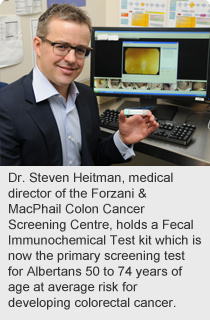
June 25, 2014
Story by James Stevenson; Photo by Paul Rotzinger
More than 80,000 Albertans completed the new, easy-to-use colorectal cancer screening test since it became available last November, and it could soon have a major impact on one of the most common and deadliest cancers in the province.
The Fecal Immunochemical Test (FIT) – a home stool test with no dietary restrictions – is now the primary screening test for average-risk Albertans between the ages of 50 to 74 and is designed to save lives by detecting the cancer earlier.
“With about 80,000 tests performed in the first five months that FIT has been available, we’re significantly ahead of our initial target of nearly 62,000 tests,” says Dr. Clarence Wong, Medical Lead of the Alberta Colorectal Cancer Screening Program.
“This tells us that FIT is being well received by both the public and by family doctors, and is a key part of our larger screening program.”
Of those people tested, nearly 10 per cent are coming back with an abnormal result and are prioritized for an urgent followup colonoscopy.
“So far, it appears to be a very sensitive test,” says Wong. “Not all the abnormal results that come back are cancers or pre-cancerous polyps but, as a triage tool, it’s pretty amazing.”
The simple stool test is also expected to help free up capacity for screening-related colonoscopy services – a procedure that can also remove those polyps – improving access for people who need it more urgently. Every year, about 1,900 Albertans are diagnosed with colorectal cancer and about 600 die of the disease. Nearly one million Albertans may be eligible to take the test.
Colorectal cancer can develop from pre-cancerous polyps that are small growths on the inner wall of the colon and rectum. There are different types of polyps and not all have the potential to grow into a cancer.
Pre-cancerous polyps can continue to grow over a long period of time without any symptoms before they become cancer. Screening can detect cancer at its early stages, and can also detect some pre-cancerous polyps which can then be removed before they develop into cancer.
Alberta Health Services (AHS) aims to have at least 70 per cent of Albertans between the ages of 50 to 74 up-to-date with colorectal cancer screening within the next five years. Those rates are currently about 50 per cent or lower, especially in rural areas.
“A significant rise in screening rates would have a tremendous impact in Alberta for a cancer that can often be controlled or prevented when you catch it early enough,” says Dr. Paul Grundy, Senior Vice President and Senior Medical Director of CancerControl Alberta.
Colorectal cancer is one of the most commonly diagnosed cancers in Alberta, and is the second most deadly form of the disease behind lung cancer. Approximately one in every 13 men, and one in every 16 women, will develop invasive colorectal cancer in their lifetimes.
Screening programs aim to reduce colorectal cancer incidence rates by 20 per cent and mortality by 30 per cent.
Use of FIT is consistent with most provincial colorectal cancer screening programs in Canada. It is more accurate and effective than previous tests. Once a sample is acquired at home, it is returned to a lab for testing.
According to new Alberta guidelines, all Albertans aged 50 to 74 who are at average risk of developing colorectal cancer should have a FIT every one to two years. Albertans in this age range are encouraged to discuss with their family doctor or health care provider about taking the FIT and where to get the test kit.
The Alberta Cancer Prevention Legacy Fund funded the first year of FIT implementation, while ongoing operational funding for the screen test will be covered by AHS.
For more information about Alberta’s population-based cancer screening programs for colorectal, breast and cervical cancer, please visit: screeningforlife.ca